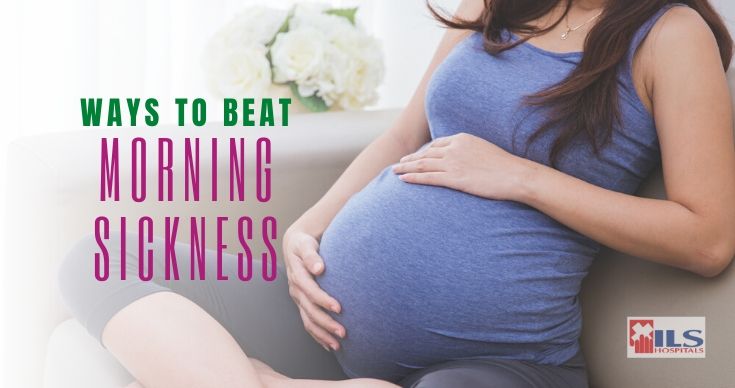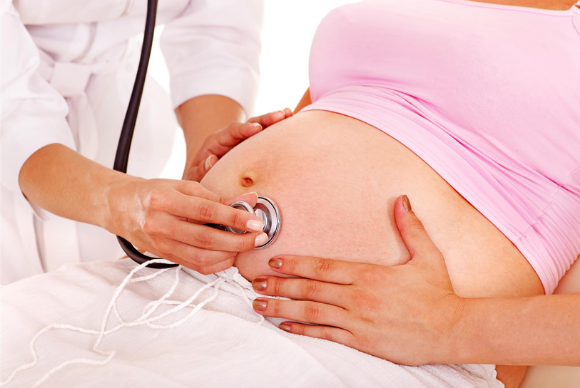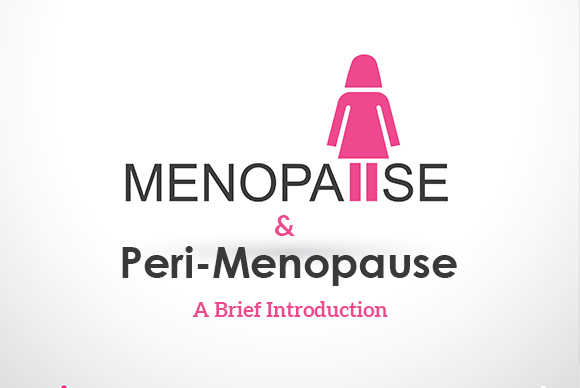Childbirth: ILS Hospitals’ Guide On Postpartum Depression
Pregnancy and childbirth are incredible experiences but for some women, they can also become overwhelming. Sometimes, pregnancy and delivery are not sunshine and rainbows because baby blues are real. Baby blues are a psychological condition felt by women right after delivery. When you have baby blues, you feel unhappy and emotionless for no reason. Usually, baby blues go away on their own within a week but in case if a new mother has baby blues that last longer than two weeks then she might be suffering from postpartum depression.
(Get premium care during pregnancy and childbirth from ILS Hospitals, the best maternity hospital in Kolkata and Agartala)
Postpartum depression is a serious mental condition that happens to new mothers post childbirth due to psychological and hormonal changes in the body. You’re more at risk of developing postpartum or postnatal depression if you fall under the following criteria:
- History of depression or other mental disorder
- Do not have support from the spouse, family, and friends
- Lack of sleep
- Have an unwanted and unplanned pregnancy
- Dealing with a financial crisis
- Living a stressful life
- Genetics.
Symptoms of Postpartum Depression
- Feeling sad and hopeless
- Mood swings
- Frequent crying without any reason
- Insomnia or hypersomnia (sleeping too much)
- Anxiety
- Poor appetite
- Difficulty concentrating
- Anti-social behaviour
- Anhedonia (not enjoying things that were once enjoyable)
- Thoughts of hurting the baby or oneself.
If you have the above symptoms that persist for more than one or two weeks, do not delay getting medical treatment.
Treatment for Postpartum Depression
Once you’ve been diagnosed by the healthcare professional for postnatal depression, you might be prescribed the following treatment:
- Talk therapy
- Medications – mostly antidepressants
- Electroconvulsive or shock therapy (in severe cases when the above methods don’t work)
Visit ILS Hospitals, one of the best hospitals in Agartala and Kolkata to get an accurate diagnosis and effective treatment for postpartum depression.
6 Best Ways To Manage Morning Sickness During Pregnancy
With pregnancy comes various other health issues, many a time leading to complications as well. One such common health issue associated with pregnancy is morning sickness or nausea and vomiting. Majority of pregnant women deal with morning sickness during the first trimester of their pregnancy.
According to gynaecologists from the best maternity hospital in Kolkata, morning sickness comes to an end during the 12-14 weeks of pregnancy (onset of the second trimester). Although the name is morning sickness, nausea and vomiting can happen at any time of the day. Morning sickness is very difficult to manage, therefore ILS Hospitals, one of the best hospitals in Kolkata and Agartala will show you 6 best ways through which you can easily manage morning sickness during pregnancy.
Eat small and frequent meals
Instead of eating big 2-3 meals a day, opt for small and frequent 5-6 meals a day. This will help a lot to curb nausea.
Snack healthily
Do not stay empty stomach for a long time. Because an empty stomach can make your morning sickness worse. Eat healthy snacks, like makhana or fox nuts, poha, upma, oats, sandwiches, soups, healthy cold fruit and vegetable juices, nutrition bars, etc.
Skip nausea-triggering foods
Avoid foods that trigger your nausea. In general, foods that amplify morning sickness are fried and fatty foods, acidic foods, odorous foods (onions), and spicy foods.
Try ginger
Ginger has helped a good percent of pregnant women during their morning sickness. If ginger works for you, try drinking ginger black tea, ginger ale, and ginger lozenges.
Avoid strong fragrances
Strong smells might aggravate nausea in some women. Do not wear perfumes with a strong scent. Avoid using room fresheners with high fragrance and stay away from cigarette smoke.
Take plenty of rest
Get 8-9 hours of sleep every night. If possible, sleep for a few hours during noon.
Consult an expert gynaecologist
Consult an expert gynaecologist and ask him or her to prescribe you anti-nausea medicines.
You can get a medical consultation from our renowned gynaecologists by visiting our hospitals in Agartala and Kolkata.
5 Common Complications Faced By Pregnant Women
Carrying another life inside you is both a blessing as well as the most challenging task. Thankfully the expert gynecologist and obstetricians help you thoroughly for the same. In fact, maternity hospitals are all equipped to make this experience as comfortable and safe as possible. But there are certain complications that might make it difficult though. Here we present some complications that may arise during pregnancy.
1. Hypertension

It is also known as high blood pressure. It occurs when the blood flowing in the blood vessels exerts too much pressure. This happens when these vessels get narrowed due to some reason. This causes hindrance for the blood to reach the placenta (which provides oxygen and nutrition to the baby). This deprivation for long can cause a slower growth of the baby and can also uplift the chances of preterm labor.
2. Gestational Diabetes

It is a rather unique type of diabetes in which a pregnant woman, with no history of high blood sugar gets diagnosed with it. Even though most of the time gestational diabetes get resolves on its own, after childbirth, it uplifts the probability of several other complications during pregnancy and thus its constant treatment is required. Also, it makes the mother susceptible to diabetes in the future, so she should keep her sugar level in check.
3. Preeclampsia

It is a rather serious condition which has quite severe effects. Its causes are often unknown, but it can be a more likely scenario in case of the first pregnancy or in the case the mothers is obese or is older than 35, or carrying multiple babies or have suffered from the same condition in her previous pregnancy.
It is characterized by exceptionally high blood pressure and in case if it is left untreated it can cause organ damage.
4. Placenta Previa

As already discussed, placenta nourishes your baby before birth. The placenta is usually attached to the top of the uterus and in case of this complication, it slides down. It can cover the cervix (right on the birth canal) either partially or totally. Needless to say, it can cause a hindrance during childbirth and can make it strained labor for the mother and somewhat risky for the baby. It can be diagnosed accurately during a pre-natal scan. Extensive treatment under an expert obstetrician is crucial for such cases.
5. Severe Vomiting and Nausea

Morning sickness is quite common among expecting mother. It is characterized by feeling nausea and voting in the early morning, particularly during the first trimester. Its severe form is called hyperemesis gravidarum and it causes extreme nausea and vomiting along with weight loss, dehydration, fainting and loss of appetite that often need extensive treatment in some maternity hospital.
Good prenatal care is highly recommended for every pregnant woman along with timely medication and prenatal screening. It can ensure that any pregnancy-related complications can be addressed and treated effectively on time. Come at ILS Hospitals to have a safe pregnancy and childbirth ahead.
Menopause and Peri Menopause – A Brief Introduction
Menopause is the natural cessation of the menstrual cycle in women. It marks the termination of reproductive age. The ovaries are reproductive glands which store eggs and release them one by one each month through the fallopian tube. It also releases the female hormones estrogen and progesterone. Altogether it controls the menstrual cycle and ovulation cycle, both contributing towards natural conception. Gynecologist defines menopause as the phase when the ovaries stop producing the same.
Read more – Hormonal Issues Faced By Women After Menopause
In general, it occurs in the late 40s to early 50s and gives an indication for a few months (sometimes even years) before it. However, it can also happen promptly due to surgical removal of ovaries or uterus or due to any illness. Peri-menopause, on the other hand, is the natural phase that begins 3-4 years before the menopause, but in many cases, it can onset even from the 30s. Women can still conceive and give birth successful while being in peri-menopause.
Several women experience some mild to severe discomfort and annoying symptoms during peri-menopause and menopause.
- A sudden, brief sensation of warmth all over the body, more commonly known as hot flashes
- Vaginal dryness and discomfort during sex
- More frequent urination or the urge to do so
- Persistent insomnia or interrupting sleep cycles
- Mood swings, that might also include periodic or unpredictable depression
- Temporary memory lapse, difficulty in concentration
- Night sweats or sudden cold flash
- Much heavier or lighter, or irregular periods
- Breast tenderness or change in size
- Change in Premenstrual syndrome
- Weight gain along with pain in joints and muscle
- Losing interest in intimacy
- Hair loss
These systems are the indication of ovaries producing less estrogen. In case any women encounter 3 or more of these symptoms for about 3-4 months and is in her late years of childbearing age (or even during), they are highly recommended to seek a gynecologist for a detailed investigation.
Menopause is NOT a disease and cannot be avoided. It is a natural, obvious phase that will onset and eventually be over. Peer to peer talk is quite helpful for most women and so is having awareness related to the changes during menopause. However, menopause comes as a hard time for many women. It is crucial to seek treatment in case the symptoms bother. At ILS Hospitals, our expert gynecologists offer extensive treatment, help, and guidance for women going through the phases of menopause.
What Is Painless Delivery And How It Is Carried Out
The wonderful journey of motherhood begins with pregnancy and childbirth is a crucial event in it. Babies are coming into the earth since the dawn of humankind, sometimes with little to no assistance, all through natural birth. Gradually came the technique of cesarean birth, which offered some advantages for complicated birth. Nowadays, ‘painless delivery’ is being offered by many advanced obstetrician and maternity hospitals. Let’s understand what painless delivery is and how it is carried out.
The labor phase is a painful and traumatic experience for many mothers. The birthing method is a crucial factor for the same, but it also depends on the pain tolerance level of the mother and overall conditions. But thankfully, the expert obstetricians and medical science can help ease the pain these days, with the help of ‘painless delivery.’
What Is Painless Delivery?
Painless delivery is sort of a ‘nickname’ for a natural birth with the administration of a special drug called epidural. Epidural reduces pain significantly in a specific area. In case of labor, it is administrated right in the spine, cause a somewhat numbness in the lower part of the body. With epidural in your system, you are still awake and feel the contraction and can push your baby.
It is induced for natural birth as per the will of the mother or as necessity felt by the doctor. It is also administrated in case of carrying out a C-section. Even though some minor risks such as back pain, fever, and headaches are associated with the epidural, they are extremely rare and poses no long term complications.
Is Painless Delivery totally Painless?
Well, definitely not. While you are welcoming your little baby in the world, it is inevitable to feel some pain. With no epidural, the magnitude of this pain is tremendously high for many mothers. This magnitude can be significantly reduced with the administration of the epidural. With less severe labor pain, you can concentrate more on giving birth and make it a comfortable experience altogether.
Should You Consider Getting A Painless Delivery?
There is no definite yes or no answer for the same. You, along with your partner and obstetrician need to discuss all the possibilities of birth. However, in case you have a low tolerance for pain or becoming a mother for the first time, you should definitely be aware of the same and consider it as one of the options.
Gestational Diabetes And Its Consequences On Mother & Baby During Pregnancy
A successful pregnancy ends with a safe childbirth from where you take a new step to the journey of motherhood, this time, holding your child in your arms. Almost every maternity hospitals in Kolkata offers both Cesarean and natural delivery and the suitable birthing option is chosen by the help of both parents and the doctor. Several conditions during the pregnancy, sometimes leave a very little room for the choice and compel people to go for a particular procedure. Gestational diabetes is one such condition. Let’s see what it is and how it might influence birthing options.
What is Gestation Diabetes?
Gestation diabetes is a unique kind of diabetes that onsets only during pregnancy. Thankfully, it often resolves on its own after childbirth, but it complicates several aspects of pregnancy and childbirth. Unmanaged or undiagnosed diabetes often has severe consequences.
How It Affect The Fetus?
The large fetal size is one such common complication, in which the size of the fetal baby is abnormally large. In medical terms, they are referred to as Large for Gestational Age (LGA), Macrosomic infants and they can often weigh up to 12 pounds. This happens when the baby starts producing a high level of insulin as an auto response to a high level of glucose produced by the mother’s body. This exceptionally large size makes the natural birthing option a risky procedure for both the baby and the mother.
How It Complicates Childbirth?
Delivering the baby naturally, through the birth canal is challenging because of the large body structure, which might get wedged during the childbirth. In fact, ‘shoulder dystocia’ is a common complication that is found in such cases. This complication arises when the shoulder of the baby gets stuck in the mother’s pelvic bone due to large shoulder and upper body fat. It can lead to fracture and other injuries to the baby’s neck or collarbone. Moreover, due to prolonged and more strained labor, the baby often does not get enough oxygen during labor and that might lead to severe life-threatening consequences as well.
How It Is Risky For Mothers As Well?
It brings challenges to the mother as well. Delivering the large baby significantly increases the chances of having labor-related bruises, tear, pain and bleeding. Often a cesarean delivery is opted to ensure a safe childbirth, but it has risks of its own.
What Can Be Done?
Thus, as it is clearly indicated, having gestational diabetes can have several effects on both mother and the baby, it is crucial to seek consultations and care from reliable maternity hospitals to ensure a safe pregnancy and childbirth ahead. Seek consultation from experience Gynaecologist of ILS Hospitals for any such complications to ensure safe pregnancy and childbirth.
What Exactly Is Nutritious Food And How Crucial It Is For Health
“A healthy diet is a solution to many of our health-care problems. It’s the most important solution.” -John Mackey
If only one can consume the right food, the right amount at the right time, staying healthy will become a piece of cake. It is recommended by maternity hospitals to keep track of the baby’s food since the age of 6 months old itself. A nutritional food ensures ideal growth, mitigates several illnesses and promote health. As we are observing the National Nutrition Week from 1st to7th September, we present what ideal, balanced, and nutritious food should be.

A balanced diet consists of every nutrition, which comprises proteins, carbohydrates, fat, vitamins and minerals. Consuming the following food in the adequate amount often full fills the quota of a balanced diet.
- Whole Grains
- Fresh, Seasonal Fruits
- Fresh Vegetables
- Lentils And Pulses
- Sea Food
- Meat And Eggs
- Dairy Food
- Dry Fruits
To accommodate all the above-mentioned food, one simply needs to divide their food chart to 5 times meals, namely the breakfast, mid-day snack, lunch, evening snacks, and dinner.
The exact requirement of this calorie can be calculated by Reference Intakes ratio. This RI ratio is classified as per gender, age, and level of activeness etc. It is calculated in terms of kcal and often offers an ideal amount of nutrients required by an individual. Here we present the average nutritional requirement by an adult man and woman.

As it clearly indicates that, usually men need more calories than women. However, women need extra nutrition in several phases of their life, including their growing years, during pregnancy and while nursing and caring for her newborn. As per gynecologists, proper nutrition intake is crucial for to-be and new mother to have a healthy and nourished child.
A well-balanced diet is crucial for every individual. In fact, simply limiting the amount of junk food consumption can also contribute towards a healthier tomorrow. In case one is wondering how can they remove the entire genre of fast food in one go from their diet chart, well, it has to be done in small steps. Eventually substituting them.
As rightly said by one smart anonymous individual, follow this
“One simple rule- if it is coming from a plant, eat it and if it is being made in a plant, don’t.”
It will help you decide what should be on your platter.
An Insight of Surgeries Carried Out in ILS Hospitals
In this era, we have advanced technology for most of the things around us. However, even the best medication cannot resolve every illness. Thankfully, we have surgical treatment to address, resolve and cure such illnesses. With the help of the state-of-the-art technology such as the laparoscopic surgery, the remedy is now most effective than ever. Today, we bring insights of surgeries that we carry out in the ILS Hospitals.
At ILS Hospitals, at least 50 percent of the operations we carry out are related to the gastrointestinal tract. Most of our patient had a history of chronic indigestion, constipation and another digestive issue for a significant period of time. Indeed, the occurrence of digestive complication is on a constant rise since the introduction and commercialization of the fast food industry. It is often associated along with general surgery, which involves invasive correction of soft tissue and solid organs.

The figure is shortly followed by gynaecologic and obstetrician surgeries. Apart from childbirth surgical procedure, women also seek a surgical cure and care for family planning, and other gynaecological conditions. We also provide treatment and care for women suffering miscarriage or carrying risk pregnancy.
We handle and address significant numbers of orthopaedic surgeries throughout the year. It includes both prescheduled procedures such as total and partial knee replacement, hip joint, etc and emergency procedures such as accidental injury or trauma. Our 24/7 ambulance and ICU contributes a lot towards saving these lives.
As compared to other multispecialty hospitals, we have significant numbers of ENT, dental and eye surgery in our hospitals. In fact, we had carried out a cochlear implant in ILS Agartala unit, one of the rare and leading surgeries carried out in northeast India.

Cardiac surgery is on a constant rise, not only in ILS Hospitals but at hospitals in every corner of the world. However, we specialize in handling both preschedules heart surgeries and emergency cardiac surgeries. Our patients receive enormous support and care from the expert doctors.
Apart from these, we handle an enormous amount of species in miscellaneous specialties. At ILS Hospitals, we also have several patients seeking a surgical cure for their various urological conditions. We have many patients who chose us for offering laparoscopic surgery for the same. We, at ILS Hospitals, being the pioneer of laparoscopic surgery, offer mostly keyhole operation to our patients. Needless to say, our skilled nurses and staffs stay on guard, round the clock. In case, you or your loved ones need any consultation or surgery, book an appointment with us and secure your health.
Breastfeeding Tips for Every New Mother
As Robert S. Mendelsohn rightly said, “Mother’s milk, time-tested for millions of years, is the best nutrient for babies because it is nature’s perfect food.”
If you are a mother, you can certainly relate to it. However, breastfeeding is one extremely challenging job. Many gynaecologists and obstetricians encounter new, inexperienced mother panicking due to not being able to nurse properly. So, today we are offering some tips for new mothers and moms-to-be to have a somewhat more comfortable nursing time.
- Position yourself comfortably. If you are not comfortable, neither will be your baby.
- There is no perfect rule, so choose what works best for you. Experiment and pick between couch, bed and rocking chair.
- Place as many pillows you need under back, lap or legs for support and comfort.
- Hold and cradle your baby on the same side as the breast you want to nurse with. Use a pillow for support, if needed.
- You have an overactive ‘super baby’, you can hold her lower arm under your arm to mitigate the possibility of interference.
- Cup your breast and let your baby latch onto it gently. It might take several attempts before the baby stay latched on, so be patient.
- Once the baby starts feeding, hold her close to support and encourage the nursing.
- After the baby is done, don’t pull out your nipple instantly, as it may cause injury to your nipples. Instead, insert a finger in her mouth to break off the contact gently.
Ideally, each session of breastfeeding last only several minutes, but quite frequently, as your baby’s stomach is small and digestion is quite fast. Stay prepared to get in action every few hours. Feel free to try out different lactating position to find the one working best for you. As a tip to relax, you can play some music or instrumental in a mild tone. It will encourage you to relax, have happy thoughts and focus on your bond with your baby.
While breastfeeding, you may encounter many complications such as insufficient milk supply, sore or cracked nipples etc. Moreover, if you had a high-risk pregnancy or preterm birth, your baby might have a problem latching on. Instead of enduring all the discomfort or depression, seek help. As you might need special guidance or equipment from your gynaecologist or obstetrician, get in touch with one.
Breastfeeding is a rather special time of your life. Do all you can to make this memorable and comfortable.
5 Most Common Complications To Watch Out For Every Expecting Mother
Mother – the only person who nurtures you for 9 months in her womb and forever in her heart.
As rightly said, mother’s love is beyond words. We, on behalf of entire ILS Hospitals family, salutes all the mothers in the world on this International Mother’s Day, on 13th May 2018. We hereby, list out the 5 most common pregnancy-related complication most of the expecting mother faces and should seek gynecologists for.
Urinary Tract Infection (UTI)
UTI (Urinary Tract Infection) onsets when the urinary tract gets a bacterial infection. It can be recognized by persistent primary symptoms such as frequent urination, cloudy urine, pain/burning sensation while urination and secondary symptoms such as fever, fatigue, back pain etc.
It usually is not something very severe and can be easily diagnosed with urine sample test. It is usually treated with oral antibiotics.
Anemia
Not having the ideal range of healthy red blood cells is very common complications of pregnancy. It can lead to extreme fatigue and weakness. It is addressed by folic acid and iron supplements and proper nutritional diet.
Gestational Diabetes
Pregnant women can develop a unique kind of diabetes, particularly during the pregnancy, without any prior occurrence. It happens when the body fails to process the carbohydrates properly. It is crucial to keep the blood sugar level in check during pregnancy as unmanaged diabetes can lead to pregnancy complications like preterm birth, preeclampsia, childbirth complication etc.
It is usually resolved through diet and medication, but it leaves the mother susceptible to diabetes in future.
Hyperemesis Gravid arum
It is more commonly known as morning sickness and is extremely common among mothers. It causes nausea and vomiting, especially during the morning hours, however, it can persist throughout the day as well. Often few expecting mothers experience severe morning sickness that requires treatment.
Hypertension
Commonly known as the high blood pressure, is yet another common problem during pregnancy. Unresolved hypertension can lead to severe complications such as preeclampsia, preterm birth, miscarriage, malnutrition baby, placental abruption etc.
At ILS Hospitals, we address every aspect of pregnancy and provide treatment, care, and support through every stage of it. Moreover, we offer other maternity-related services such as family planning, assistance during pregnancy and childbirth and for conception and NICU (Neonatal Intensive Care Unit) for critically ill babies. We urge every mother to seek medical help without wasting precious moments.




















